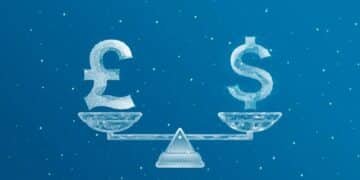Inflation’s Impact: Staying Ahead in Your Financial Plan

Inflation significantly impacts financial plans by eroding purchasing power and investment returns; strategies to stay ahead include diversifying investments, adjusting savings rates, and considering inflation-protected securities.
Navigating the complexities of personal finance becomes even more challenging when inflation enters the equation. Understanding the impact of inflation on your financial plan: strategies for staying ahead is crucial for maintaining and growing your wealth.
Understanding the Basics of Inflation
Inflation is more than just rising prices; it’s a fundamental economic force that can reshape your financial landscape. Recognizing how it works is the first step in protecting your financial well-being.
What is Inflation?
Inflation refers to the rate at which the general level of prices for goods and services is rising, and subsequently, purchasing power is falling. It’s typically expressed as a percentage increase over a specific period, usually a year.
Several factors can cause inflation, including increased demand for goods and services, rising production costs (like wages and raw materials), and expansionary monetary policies that increase the money supply.
How Inflation Affects Purchasing Power
The most direct impact of inflation is the erosion of purchasing power. When prices rise, each dollar you have buys less than it did before. This means you need more money to maintain the same standard of living. For example, if inflation is at 3%, goods and services that cost $100 last year now cost $103.
- Everyday Expenses: Groceries, gas, and utilities become more expensive.
- Savings: The real value of your savings decreases if the interest rate is lower than the inflation rate.
- Investments: Inflation can reduce the real return on investments if not managed properly.
Understanding these fundamental impacts is critical for crafting a financial plan that can withstand inflationary pressures. Now let’s dig deeper and look into its impact on the main parts of your financial planning, like investments and debts.
Impact of Inflation on Investments
Inflation can significantly erode the real return on your investments, making it essential to adopt strategies that can outpace rising prices. Failing to address inflation can mean your investments don’t grow enough to meet your long-term goals.
Stocks vs. Inflation
Historically, stocks have been considered a good hedge against inflation because companies can often pass on increased costs to consumers, leading to higher revenues and profits. However, this isn’t always guaranteed, especially in periods of high or unexpected inflation.
Bonds vs. Inflation
Bonds, particularly those with fixed interest rates, can be vulnerable to inflation. If inflation rises above the bond’s yield, the real return becomes negative, reducing the bond’s value. Treasury Inflation-Protected Securities (TIPS) are specifically designed to protect against this risk by adjusting their principal value with inflation.
Real Estate vs. Inflation
Real estate can act as a hedge against inflation. Property values and rental income often increase during inflationary periods. However, rising interest rates, which often accompany inflation, can make mortgages more expensive. So you should always consider all options.
- Diversification: Spreading investments across various asset classes can help mitigate inflation risk.
- Adjust Investment Strategy: Reassess your portfolio regularly to ensure it aligns with your risk tolerance and inflation expectations.
- Consider Inflation-Protected Securities: Include TIPS or other inflation-linked bonds in your portfolio.
In summary, inflation poses a significant risk to investment returns, but strategic asset allocation and the use of inflation-protected securities can help mitigate its impact. Now let’s proceed to another important factor of your financial plan: debts.

How Inflation Affects Debt and Loans
Inflation affects not only your investments but also your debts. Understanding how inflation interacts with different types of loans is crucial for effective financial planning.
Fixed vs. Variable Interest Rates
Fixed-rate loans, such as mortgages and student loans, offer predictability during inflationary periods. Your payments remain the same, and inflation effectively reduces the real cost of the debt over time. With variable-rate loans, the interest rate can increase with inflation, making the debt more expensive.
Good Debt vs. Bad Debt in Inflationary Times
In an inflationary environment, some debts can become more manageable, while others can become a burden. “Good” debt, like mortgages, can become easier to pay off as your income rises with inflation, but your payments remain fixed. “Bad” debt, such as high-interest credit card debt, can become more problematic as rates may increase even further.
Strategies for Managing Debt During Inflation
During inflationary times, it’s wise to prioritize paying off high-interest debts to avoid escalating costs. Consider consolidating debts or transferring balances to lower-interest options. Negotiating with creditors or exploring debt management programs can also provide relief.
- Prioritize High-Interest Debt: Focus on paying off credit cards and other high-rate loans first.
- Consider Debt Consolidation: Combine multiple debts into a single loan with a lower interest rate.
- Refinance Variable-Rate Loans: Consider refinancing into a fixed-rate loan to lock in a predictable payment.
In conclusion, understanding the interplay between inflation and debt can help you make informed decisions and manage your financial obligations effectively. Next, let’s dive into budgeting and savings and some strategies to optimize it in the current financial ambience.
Budgeting and Saving Strategies in an Inflationary Environment
Effective budgeting and saving are essential for navigating the financial challenges posed by inflation. Adjusting your spending habits and savings strategies can help you maintain your financial stability.
Revisiting Your Budget
Start by reviewing your current budget to identify areas where you can cut back on expenses. Prioritize essential spending and look for ways to reduce discretionary expenses. Consider using budgeting apps or spreadsheets to track your income and expenses effectively.
Cutting Expenses
Look for opportunities to reduce costs in areas like dining out, entertainment, and transportation. Consider alternatives such as cooking at home more often, finding free or low-cost entertainment options, and using public transportation or carpooling.
Increasing Income
Explore opportunities to increase your income, such as taking on a side hustle, freelancing, or asking for a raise at work. Even a small increase in income can help offset the impact of inflation.
- Track Expenses: Monitor your spending to identify areas where you can cut back.
- Set Realistic Savings Goals: Adjust your savings targets to account for inflation.
- Automate Savings: Set up automatic transfers to your savings account to ensure consistent contributions.
Effective budgeting and strategic saving are critical for navigating inflationary pressures. By revisiting your budget, cutting expenses, and finding ways to increase your income, you can maintain financial stability and continue to work toward your financial goals. Now let’s dig deeper into saving strategies and see how to adjust them with the aim of being more effective.

Adjusting Savings Strategies to Outpace Inflation
Traditional savings accounts often provide interest rates that are lower than the inflation rate, leading to a decrease in the real value of your savings. Explore alternative savings strategies to keep your money growing.
High-Yield Savings Accounts
Consider moving your savings to a high-yield savings account, which offers more competitive interest rates than traditional accounts. These accounts can help you earn more on your savings and potentially outpace inflation.
Certificates of Deposit (CDs)
CDs offer fixed interest rates for a specific period. While they may provide higher rates than savings accounts, your money is locked in for the term. Consider laddering CDs with varying maturity dates to access funds while still earning higher interest.
Investing in Treasury Inflation-Protected Securities (TIPS)
TIPS are designed to protect investors from inflation. The principal value of TIPS increases with inflation, as measured by the Consumer Price Index (CPI). They can be a valuable addition to your portfolio, providing a hedge against rising prices.
- Emergency Fund: Ensure you have an emergency fund to cover unexpected expenses without incurring debt.
- Long-Term Savings: Focus on long-term savings goals, such as retirement, and adjust your investment strategy accordingly.
- Seek Professional Advice: Consult with a financial advisor to tailor your savings strategy to your specific needs and goals.
By adjusting your savings strategies to include high-yield accounts, CDs, and TIPS, you can better protect your savings from the erosive effects of inflation and ensure your financial goals remain within reach.
Seeking Professional Financial Advice
Navigating the complexities of financial planning in an inflationary environment can be challenging. A financial advisor can provide personalized guidance and help you make informed decisions. A professional can provide you with specific advices for your current financials.
Benefits of Working with a Financial Advisor
A financial advisor can assess your current financial situation, define your goals, and develop a tailored financial plan that considers the impact of inflation. They can also help you make informed investment decisions and manage your debt effectively.
Choosing the Right Financial Advisor
Look for a financial advisor who is experienced, knowledgeable, and trustworthy. Check their credentials, ask for references, and ensure they have a fiduciary duty to act in your best interest. Consider advisors who are fee-only, as they do not receive commissions for recommending specific products.
How a Financial Advisor Can Help with Inflation Planning
A financial advisor can help you adjust your investment strategy, optimize your savings, and manage your debt to mitigate the impact of inflation. They can also provide ongoing support and guidance to help you stay on track toward your financial goals.
- Personalized Financial Plan: Tailored strategies to address your specific needs and goals.
- Investment Guidance: Informed decisions on asset allocation and investment choices.
- Debt Management: Strategies to manage and reduce debt effectively.
Seeking professional financial advice can provide valuable insights and support as you navigate the challenges of inflation and work toward your financial goals. Having someone that knows your financial planning and the proper way to improve it and protect it against the economic instabilites it’s fundamental for safety and confort.
| Key Point | Brief Description |
|---|---|
| 💰 Investment Diversification | Spread investments across assets to mitigate inflation risk. |
| 📊 Budget Review | Revisit and adjust budget to cut non-essential expenses. |
| 🔒 Debt Management | Prioritize paying off high-interest debts to reduce costs. |
| 📈 Seek Professional Advice | Consult with a financial advisor for tailored strategies. |
Frequently Asked Questions
▼
Inflation is the rate at which the general level of prices for goods and services is rising, reducing your purchasing power, meaning each dollar buys less over time.
▼
Diversify your investment portfolio across various asset classes like stocks, real estate, and inflation-protected securities. Also, reassess your portfolio regularly.
▼
Yes, focus on paying off high-interest debts to reduce costs. Consider consolidating debts or transferring balances to lower-interest options for better financial management.
▼
TIPS are designed to protect investors from inflation. The principal value of TIPS increases with inflation, providing a hedge against rising prices measured by the CPI.
▼
Inflation erodes the real value of your retirement savings. To combat this, invest in assets that outpace inflation, regularly adjust your contributions, and seek professional advice.
Conclusion
In conclusion, understanding and proactively addressing the impact of inflation on your financial plan: strategies for staying ahead is essential for securing your financial future. By diversifying investments, managing debt wisely, and seeking professional advice, you can navigate inflationary pressures and maintain your financial well-being.





